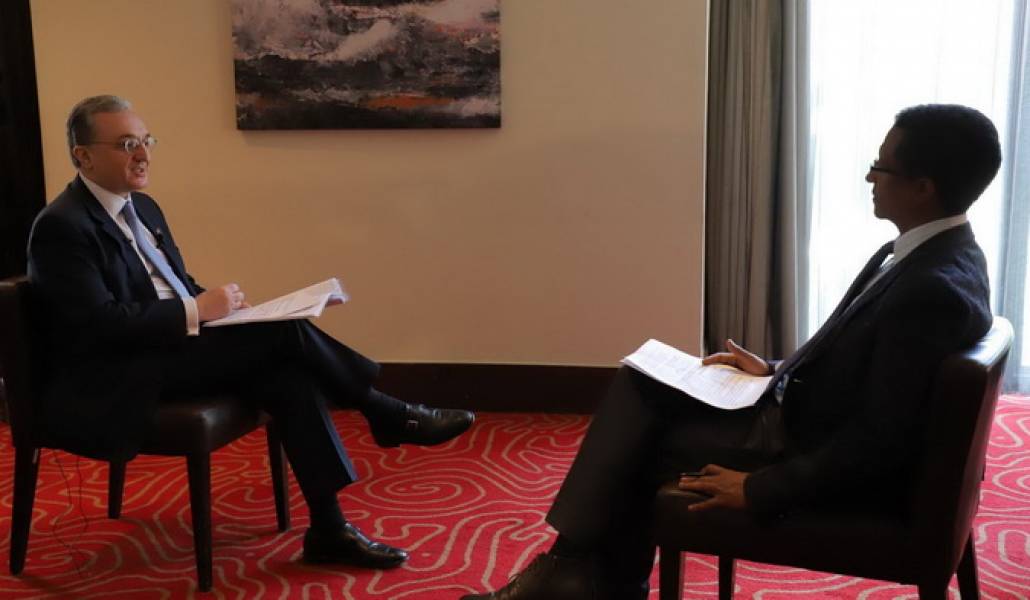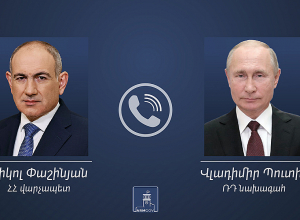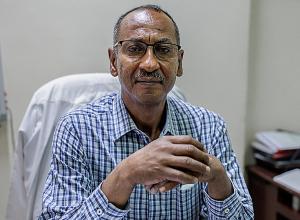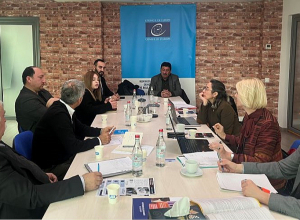What are you going to take from Ethiopia? - interview of Armenian foreign minister to Ethiopian Broadcasting Corporation (video)

The full interview the Armenian foreign minister Zohrab Mnatsakanyan to the Ethiopian Broadcasting Corporation is presented below: - Welcome to Addis Ababa and thank you very much for your time, sir. - Thank you so much. It is immense pleasure for me to be in Addis Ababa. Yesterday and today I am on an official visit. I have been enjoying great hospitality from the people and the government and the leadership of Ethiopia and I'm very hopeful that this visit will be an important contribution to taking the relations between the two states, the two nations to a new level. Thank you. - That's very interesting. It is your first time to visit Addis Ababa and how did you find it? - I found a very warm welcome here and mutual understanding and mutual determination to attach new quality of relations between two peoples who have been knowing each other for so many centuries, who have so much in common, who have so much mutual respect, so much shared history and shared civilization. - Let's have your perception, what image imprinted in your memory about this country. What do you know about this country in history? - You know when we first announced about our plans to make this visit to Ethiopia... last year we were discussing in Armenia about the plans for the next year and it was declared that one of the important functions will be the visit to Ethiopia. I was so impressed by the reflections of the people in Armenia about Ethiopia. It immediately sparks this respect and memory and knowledge of the deep relations between the two peoples. Ethiopia is very well known in Armenia. Ethiopian people are very well known and deeply respected in Armenia. And that is not surprising because the two peoples have been building relations over centuries. We are bound by this heritage. We're bound to attach, as governments, new strong impetus to this but it is based on very fertile ground of mutual respect in Armenia. Whenever the Ethiopian people are in Armenia they will find that deep understanding deep knowledge and awareness of how much in common we have in so many fields. History is a very important thing. History and our memory is a very strong thing. Civilizationally, were very attached and that is a foundation of respect, foundation of friendship. And this is the spirit with which we came here in Addis Ababa today.
-What did the government of Armenia and the people of Armenia know about Ethiopia? - Look when you look at history, it goes way back. The Armenian Apostolic church and the Ethiopian Church together with their Assyrians and the Coptic Church, we have been in unity for a very long time. We have chosen to build our relations on our spiritual ground throughout history. Armenians have been present in Ethiopia for many centuries. They have been contributors to the development and growth and the wealth of the people of Ethiopia. There are many names that you will find in the history of Ethiopia, Armenian names who have been participants, members of your society, members of your government who have been working towards building the foundations of the strength of the Ethiopian state. - Could you mention some of the names? - I know the names such as Hovhannes Dohmadjian, the chief architect Grigor Hovian, Minas Kherpikian, another chief architect. There is a chief surgeon Poghos Margarian in the 19th century. There is Tigran Hepeian, who was the chief jeweler in the state of Ethiopia. There is Mr. Nalbandian who is the author of the national anthem of Ethiopia. Mr. Sarkis Terzian who has been very instrumental in building the industry of Ethiopia and building the railway between Addis Ababa and Djibouti. - Armenians were refugees in Ethiopia. They were also so active in the business sector in this country and also don't mention the music of the choir. - Yes. That is really very important. The Ethiopian people have been very welcoming to my people and the Armenian people have been very dedicated to their newly-found home. They were members of the Ethiopian society. They are citizens of Ethiopia. They are contributors, participants of life in Ethiopia. Whereas at the same time, they were also very keen to sustain their national identity as Armenians. And that also speaks about the certain degree and spirit of tolerance and inclusiveness of the Ethiopian Society and the Armenian people have been beneficiaries of these. Contributors and beneficiaries. And here today we have not a big community but a very vibrant and very strong community, about hundred people. We enjoy the religious freedom. There is a St. George Armenian church in Addis Ababa. There is an Armenian school in Addis Ababa. The Ethiopians of Armenian descent have been very helpful to us in organizing this visit. They are bridge between Armenia and Ethiopia. I'm here with a delegation. In my delegation I have representatives of the business community the IT innovation and creative education sectors in our economy. And they are here with me and we are trying to build these relations, trying to build this cooperation with Ethiopia in the field of smart development and the Armenian community representatives are also engaged in this sector and they are representing a bridge. There already very interesting examples of cooperation between Armenia and Ethiopia. And the Ethiopian citizens of Armenian descent. They are also participants of this cooperation and that shows how rich were in our capacities of cooperation. -What is being active now between Armenia and Ethiopia? - I think we have a huge potential which has to be untapped. Today we have some elements like, for example, our experience of creative education through the Armath educational experience, educational method of encouraging creativity and talent, that has been adopted by Ethiopia. There are more things to come. There has been agreement between the institutions of Armenia and Ethiopia engaged in the field of innovation and creative education. We had an important memorandum to sign between such facilities in Armenia and Ethiopia yesterday. So in this field I see a huge potential to develop: in the IT sector, we have very interesting things to offer; in the field of e-government, e-commerce and so on; in the field of creative education and innovation; in the field of you know IT solutions. And there has been an great interest from our Ethiopian counterparts. And this is just one field in which we see great potential to develop. We intend to also strengthen our representation in Ethiopia which will be another important medium platform to expand these relations. We have a potential which has to be untapped. -That's fine. Let's get you back in history. What here to tell us about Nerses Nalbandian? - Well I think that this is just one example. Someone who is of Armenian origin but he's a dedicated citizen of Ethiopia. He made a contribution that made himself part of our conversation, part of this visit, part of interstate relations. That's a contribution. - Yeah. Now, your country Armenia is determined to strengthen its bilateral diplomatic relations with Ethiopia and has plan to open an embassy here in Addis Ababa. Where does this you go? How is the plan? - Well we have declared our intention and shared it with our friends in the Foreign Ministry of Ethiopia. We will be working towards this and in the very near future we intend to materialize this plan. We have already discussed the various modalities with our colleagues in the Foreign Ministry of Ethiopia and we will continue to build on this. - Do you know the exact time when it's going to be opened? - I would say that you know these matters require certain organizational and budgetary arrangements which we are already in the process of making. So the soonest possible dates are objective. - What are you going to take from Ethiopia and what do you think that Ethiopians can take from Armenia? - Look, as I'm saying, we have a great potential. When we look at the quality of the development in Ethiopia, it is very promising. The content of development is very promising and there are many parallels in the way, in which you see the nature of development. What the government of Ethiopia would want to put emphasis on? We have been following with great interest the developments in Ethiopia last year. Your Prime Minister is such a strong advocate of strong reform deliverable to the people. We have been through the same process. Armenia has gone through the Velvet Revolution in May of 2018, the peaceful Velvet Revolution of love and solidarity at the heart of which was exactly freeing the people's potential and strengthening democratic rule, rule of law, human rights and create equal opportunities for people in social and economic life so that people, the conduits of development, are free to generate wealth, are free to invest their talent, their capacity in wealth generation of their own and of the people and of the nation. So this is the concept and the capacity that I think is very much a strong ground to develop such relations between the two nations. Furthermore, Ethiopia is a very strong part of integration process and cooperation in the African continent. We are working in various integration processes in our part of the world. We are members of the Eurasian Economic Union, union of 200 million peoples market, a customs union for the free movement of goods and services. We are cooperating very closely with the European Union through the Comprehensive and enhanced partnership agreement. Those are the opportunities that our nations, by working together, may also use the potential in broader markets and broader integration areas. - That's nice. Let's come with the major ones. What are the major priorities between Armenia and Ethiopia? - We are very keen to strengthen and advance our political dialogue. Better and more intensive dialogue between the governments, the parliaments. We intend to strengthen also parliamentary cooperation. We are sure that in the field of economy there are many areas. But at the moment we're specifically focused on the I.T. sector, innovation and creative education sectors. And through that I'm sure we'll be opening avenues for more cooperation. We are sure that, given our historical background and commonalities and mutual respect, there is an enormous potential in developing cooperation and friendship in the fields of culture and education. I just found out that there are interesting ways of cooperation in the educational field. We have an international school in Armenia which is also welcoming and supporting students from Ethiopia. We have good potential for education in Armenia and we'll be very glad to expand these opportunities for Ethiopian students. I am sure that Armenian students would also find it interesting because your educational capacities are very interesting and very important. So those are the areas in which I think we have huge potential. - What were the major points you discussed senior officials of Ethiopian governments? - Well, these are exactly the points that we were going through. I have been very warmly welcomed by the president of Ethiopia, the Speaker of the parliament of Ethiopia and my good friend colleague the state Minister of Foreign Affairs and the Minister of Innovation and Technologies. We have been discussing exactly those points that we have been describing to you. The mutual recognition of very broad avenue we can walk together is the strong political will to take the relations to a new level. - How about the wings of hope in this country and in the Horn of Africa. This country is passing through the reform process. What can you tell us about it? - As I was saying the reforms and the developments in Ethiopia have been very impressive domestically. And this is an ongoing process. And the and enthusiasm with which these reforms are embraced and the political will and strength that your government is attaching to this are something to learn from especially on creating peace and security in the region. There was a huge step made by your government together with the government of neighboring Eritrea to find peace and that is a very inspiring example. We come from a region where there is an unresolved conflict and we, Armenia and Nagorno-Karabakh are absolutely committed to a strictly peaceful resolution of the conflict and the political will is the most important driving force to find a political peaceful resolution to the conflict. Your example is a huge inspiration that the courage, the will, and determination can make that possible. So we command and congratulate the people in the government of Ethiopia for this very important step. -How do you see the economic side? Ethiopian government is willing to open up its sectors. For instance, the financial sector, telecom and partially to privatize the Ethiopian Airlines. What can you tell us about the willingness or the ambition that this government is making? - You know I think that is huge. That will untap the potential of economic growth because you know we judge from our own experience. Privatization of the Armenian economy has been taking place since the very beginning of the reestablishment of our independence. The importance of smart and responsible privatization and the attachment of rule of law to this was the consistent challenge that you have in this process. I'm talking from our own personal experience. But we also know that the private initiative the initiative of the people are very important conduits of growth. So combination of all this. We are absolutely confident that there is a good potential. Ethiopia has an enormous potential. We are very keen to work in these areas as well. Our banking and financial sector have gone through enormous transformation and for many years stand solid ground for the economic stability of the country, for the stable growth of the country. So the financial sector and the banking sector are very important. We would be very glad to discuss this further with our Ethiopian colleagues about the way we do it and to learn also about the way you do it in Africa. The same is about the privatization of other industries. You mentioned the airlines. We can see how huge the Ethiopian fleet is. And that is, of course, a strong capacity for the economy and for its growth. - Your final words about Ethiopian-Armenian relationship. - My final word would be I would want to welcome Ethiopian delegations in Armenia. The more the better; official, youth, educational, cultural, business. I want my people to come more to Ethiopia. I want to materialize this spirit of friendship in tangible projects. And I think both nations, both people, both governments are ready for that. I want to have this conversation take place again next year in which we can say we can take stock. And we can see that there was a good progress. So this is what I would like to see.


